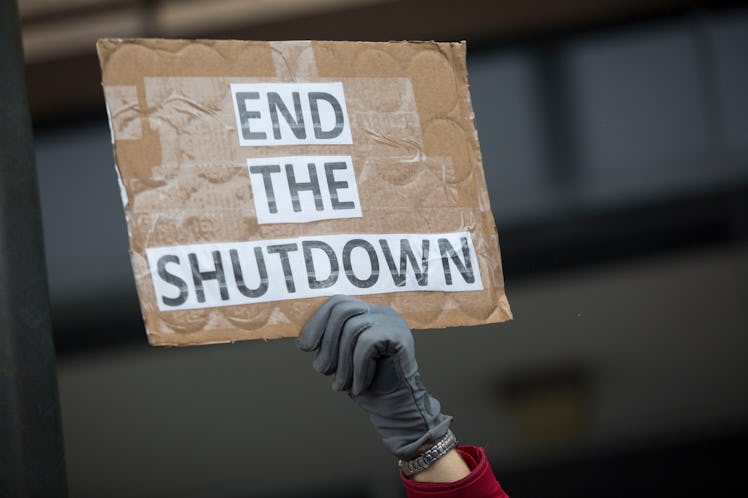
The Senate Is Introducing 2 Bills That Could Potentially End The Government Shutdown
Since the government shut down on Dec. 22, 2018, the United States has been trying to figure out how to deal. At first, perhaps no one expected this hiatus to last so long, but after an entire month of the government being shut down, parks are closed, trash is piling up, and workers are going without paychecks. In short, something definitely needs to change. Thankfully, it looks like the Senate is officially trying to stand up and take action, with two separate bills introduced in a bid to find a bipartisan solution to re-open the government. So, what's in the Senate's government shutdown bills? Here's what we know.
On Tuesday, Jan. 22, The New York Times reported that the Senate plans to hold a competing vote on bills to reopen the government Thursday, Jan. 24. The two separate bills were backed by Republican Senate Majority Leader Sen. Mitch McConnell on behalf of Republicans, and Democrat Senate Minority Leader Sen. Chuck Schumer on behalf of Democrats. Both bills address the sticking point of President Donald Trump's proposed wall on the southern border: the Republican bill will fund President Donald Trump's $5.7 billion border wall, while Democrats' bill would fund the government through Feb. 8 without a wall.
The Republican bill would reopen the government in exchange for funding Trump's more than $5 billion border wall while also providing temporary protection for "Dreamers," young immigrants who were brought to the United States as children. The bill would also, per the Times, offer as an incentive to Democrats some $12 billion in disaster relief funding and extend the Violence Against Women Act (VAWA), which was allowed to expire last year. However, it also includes measures that would make it more difficult for asylum seekers, including children, to gain refuge in the United States
In contrast, the Democratic bill consists of a short-term solution that would exclude border wall funding but would provide funds for natural disaster reliefs. This bill would keep the government open until Feb. 8, and allow the government to operate while negotiating further on border security.
Even though it appears to be a step in the right direction, the Times reported that it's unlikely either bill will receive the necessary 60 votes to pass, and therefore won't advance. So long story short, even though it looks like these bills are pointing towards progress, there's a chance that nothing will still be resolved.
The monthlong government shutdown has impacted United States federal workers tremendously, and if the Senate still can't find a solution come Thursday, Jan. 24, that means 800,000 federal workers will miss their second paycheck this month on Friday, Jan. 25. As of Jan. 12 this government shutdown, which began on Dec. 22, 2018, marks the longest in United States history, beating out its 1995 Clinton administration predecessor that lasted 22 days. Over the course of the shutdown, United States agencies have been slowly shuttering their operations. The Federal Emergency Management Agency (FEMA) issued a "stop work" to government contractors on Dec. 26, 2018 while the Food and Drug Administration (FDA) stopped routine safety inspections on food during the shutdown.
Since the government shut down a month ago, mostly over Trump's commitment to his border wall, the president and Democrats have met regularly in order to find a compromise. However, seeing as Trump is adamant about receiving the nearly $6 billion border wall funding, and Democrats have openly opposed the idea, things have been at a standstill. In fact, during a Jan. 4 meeting with Democratic leaders, Trump reportedly threatened to keep the government shut down for "for a very long period of time — months or even years" until his border wall demands are met, according to Schumer. Trump confirmed that he had made these statements later during a press conference that day. Elite Daily reached out to the White House for comment at the time, but did not hear back.
As Trump and Congress continue to battle out government shutdown deals and compromises, one can only hope that a solution will come from this ordeal. It's been a wild ride folks, but I definitely believe it's time to close the chapter on the longest shutdown in United States history.